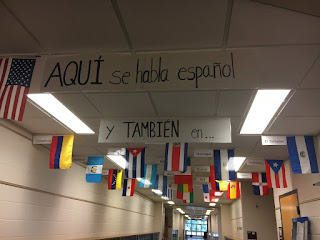For this next post about the "why" behind Spanish Immersion, I'd like to address a couple of questions I've heard quite a bit from parents...
"Will my child's English suffer?"

"How can I support my child at home if I don't speak Spanish?"
These are both GREAT questions and I really appreciate parents' honesty about these concerns. After all, it takes a lot of trust--in both the teachers and the program--to put your child into a learning setting that's in a language you may not be familiar with.
Let me address the first question first: Will your child "regress" in his/her English skills being in a Spanish Immersion setting? Or, will your child be "confused" while learning in another language that is not English?
In short, no! Children's minds are equipped to learn multiple languages, the younger the better. By exposing children to a second language, they actually become better problem solvers and actually outperform their monolingual peers in later elementary school. Your job as a parent is to continue to expose your children to rich language and vocabulary--by reading, conversing, asking questions, singing songs, organizing play dates, going to church, and going about your daily lives together as a family!
Of course, in the first couple weeks of school, your child will be transitioning into the immersion classroom environment. Expect your child to be tired as his/her brain puts in "extra hours" getting used to routines, learning new vocabulary, and starting to produce the language. But rest assured that I do not assume your child knows ANY Spanish on the first day of school--I will guide all of my students very gradually and strategically (in 100% Spanish, of course) to gain comfort in their new language of instruction.
If you're interested in reading further, here is a great article from an education blog about immersion education.
Second question: I don't speak any Spanish! How can I help my child?
Please know that it is completely ok if you do not know any Spanish! Of course, even without knowing the language, there are MANY things you can do to support your child at home...
 *READ, READ, READ! Make reading a daily habit to help your child's English vocabulary and skills to develop. In my weekly blog entries, I post a "reading tip" that I encourage you to work on. They are simple and fun to do!
*READ, READ, READ! Make reading a daily habit to help your child's English vocabulary and skills to develop. In my weekly blog entries, I post a "reading tip" that I encourage you to work on. They are simple and fun to do! *Ask your child questions about what's going on at school. In my blog, I will also provide some details about our weekly activities, so you can use this as a springboard to follow up at home. NOTE: DO NOT feel like you need to "reteach" material to your child at home! Also, especially in the first few weeks, your child may not be able to tell you about what's going on--but believe me when I say we will be learning a lot!
*Name your child the "Spanish expert" of the house. It is very empowering for kids to know more about a subject than their parents do. Make them feel good about this! Try to learn new words from your child, and show your encouragement--always!
A few personal notes to bring these ideas closer to home... in our house, we speak English and Spanish. Our kids have heard a mix of both languages since birth, and some of their first words were bilingual. Despite the mixing of languages, their vocabulary in English is quite advanced. This happened in my classroom last year too! At various points in the year, I had several parents comment to me about how impressed they were with their children's vocabulary development, even though English was not the language of instruction!
Here is another great article from add.a.lingua about some of the myths behind immersion programs.
OK, I know that was a lot of information! As always, I am happy to receive feedback, questions, and/or concerns you may have.
I trust that as the summer begins to draw to a close, you may soak up every moment, every barbecue and bonfire, every pool party and beach day, every ice cream cone and watermelon slice. Looking forward to seeing you soon!
